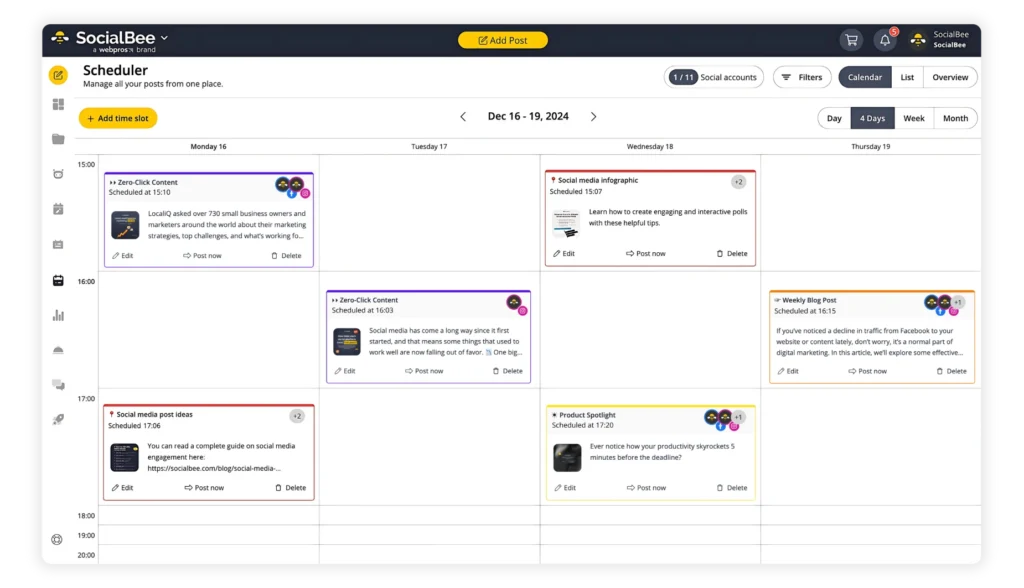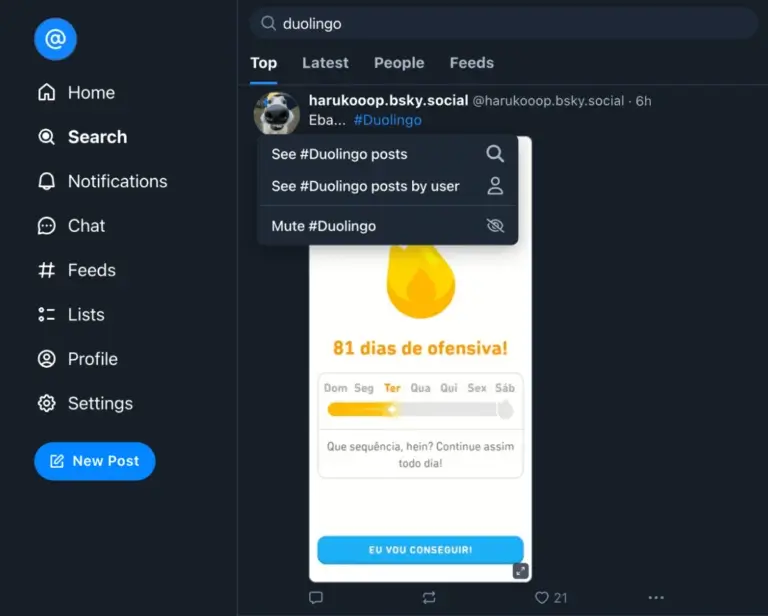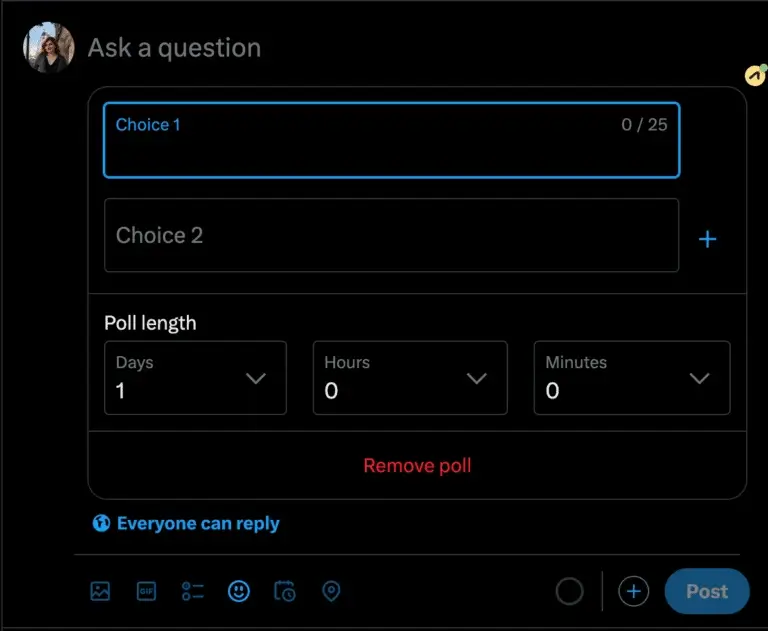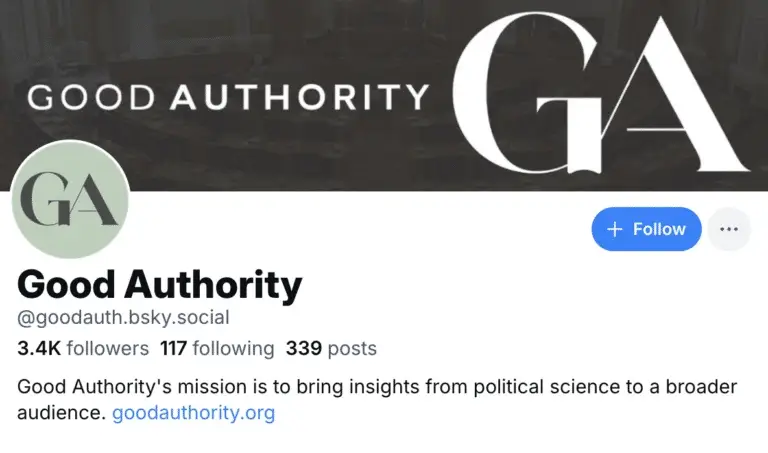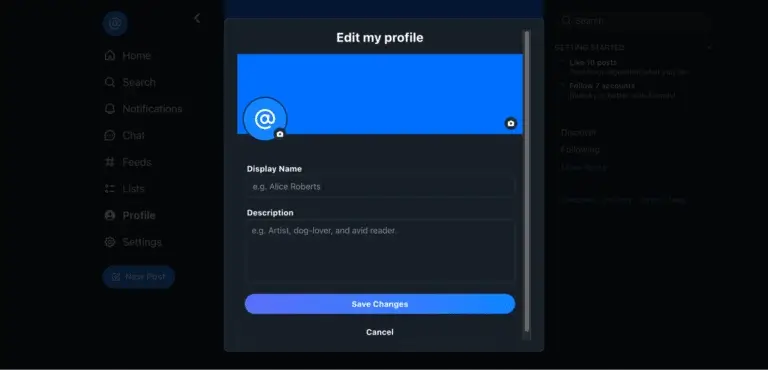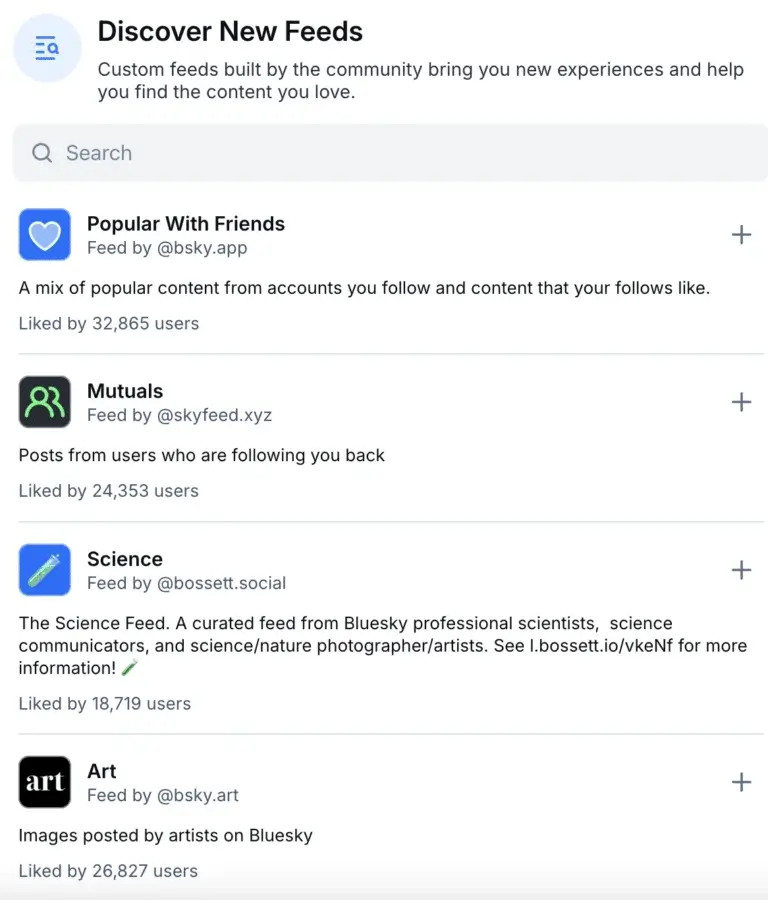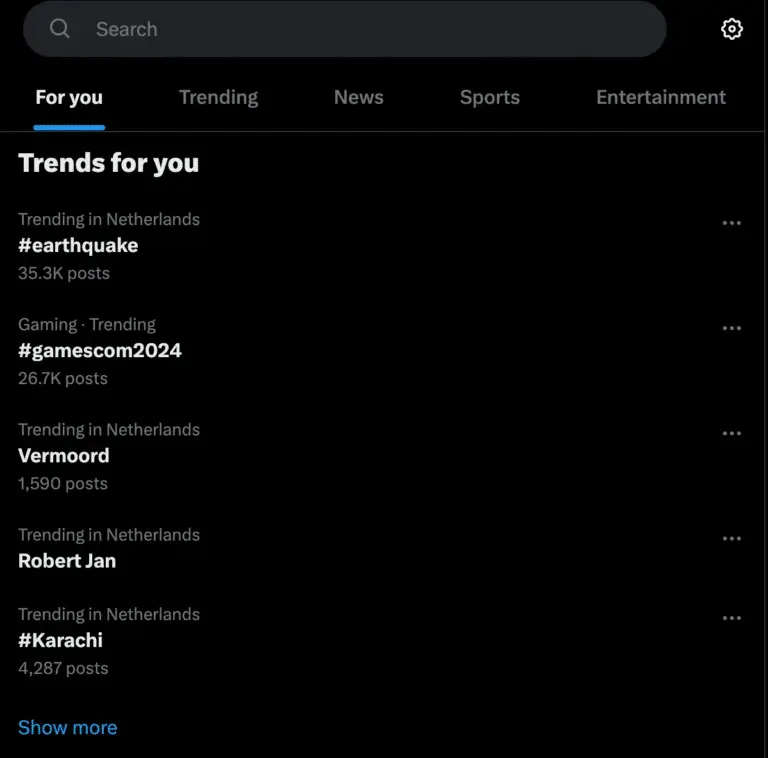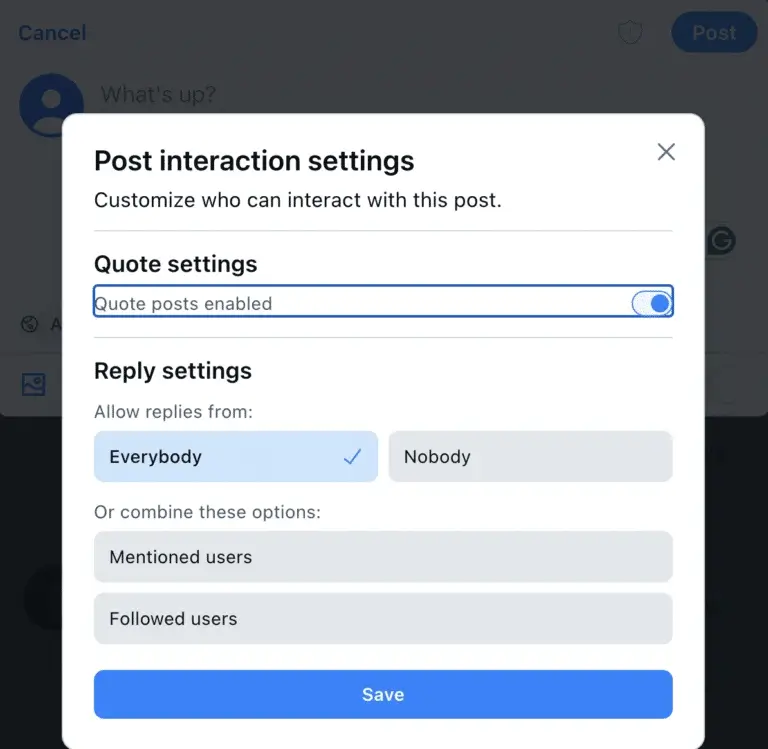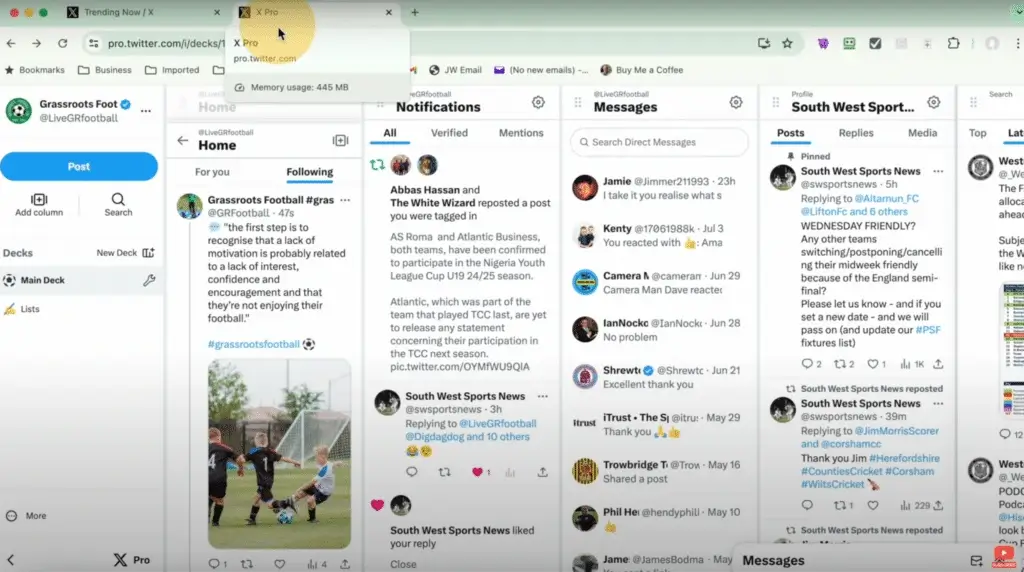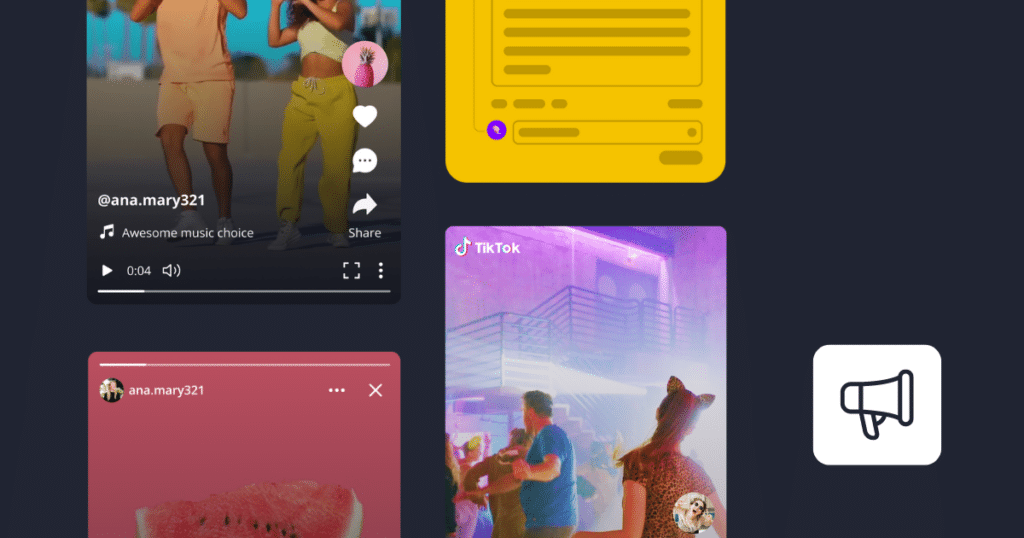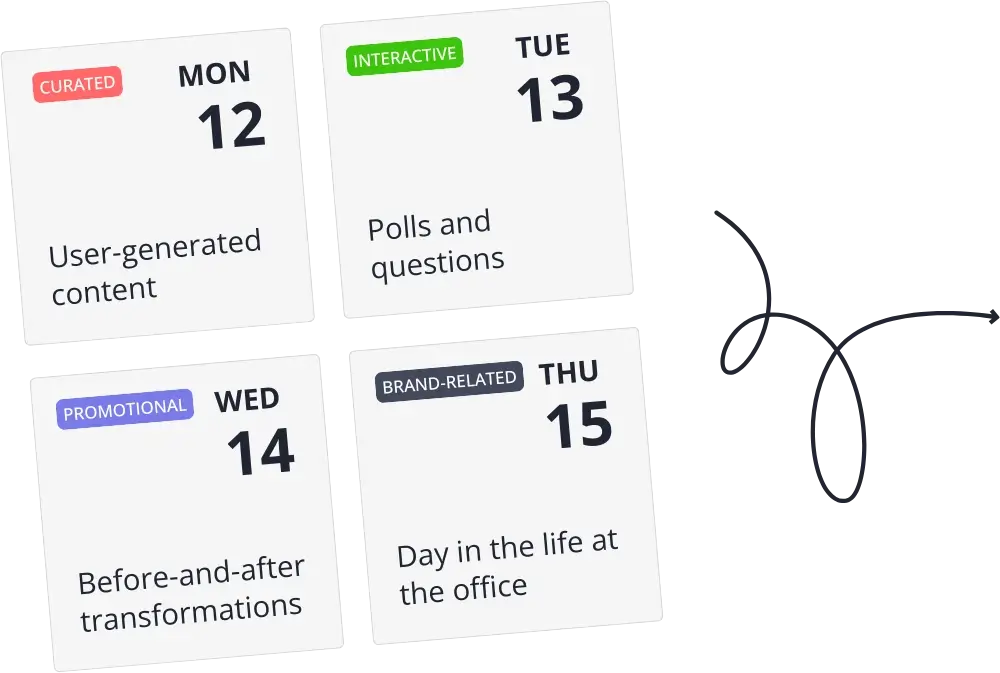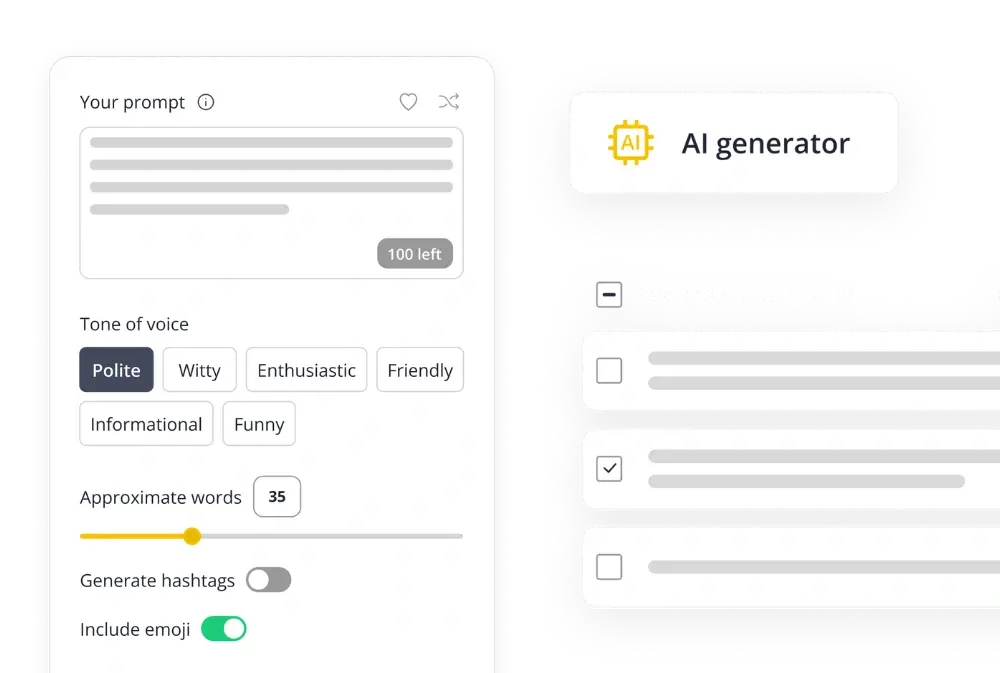With all the buzz around Bluesky, you’re probably asking yourself how it compares to Twitter (now X). Both social media platforms have ties to ex-Twitter CEO and founder Jack Dorsey, but Bluesky takes a slightly different approach.
As social media evolves under Musk’s control of X, Bluesky is offering a fresh Twitter alternative by introducing a decentralized model. This means users can set up custom domains, control their own content, and even have more flexibility over what they see and share. X offers a more Twitter-like experience with familiar features such as trending topics, quote tweets, and paid verification.
In this article, we’ll break down how Bluesky’s decentralized structure offers more control and customization compared to X’s traditional, top-down approach, as well as some other must-know differences between the two platforms.
We’re SocialBee LABS SRL, part of WebPros. We use the information you provide to share relevant content and product updates, as outlined in our Privacy Policy. You can opt out anytime.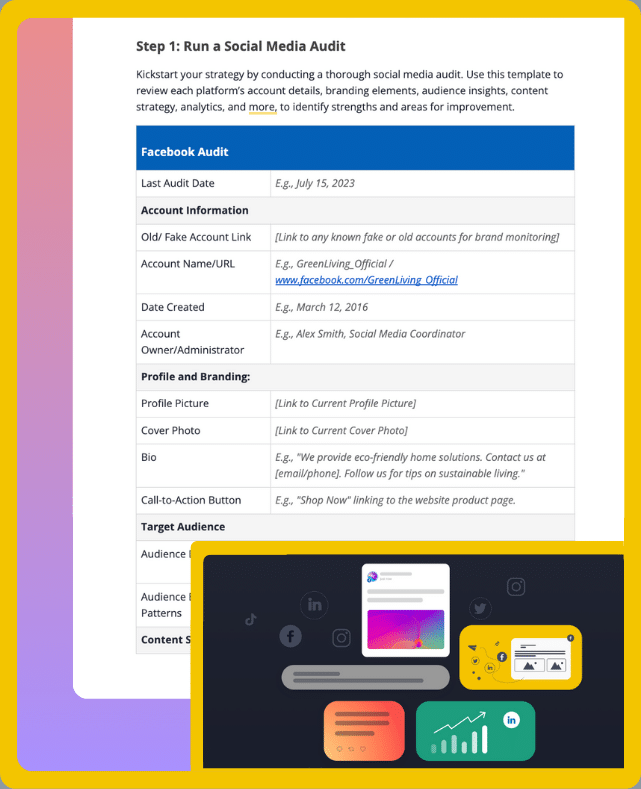
Short summary
- Bluesky gives users more control through its decentralized model. This means that instead of relying on a single company (like X) to manage data and content, each Bluesky user can control their own information and interactions more independently.
- X (formerly Twitter) is a centrally managed platform with more built-in features but less user autonomy.
- You can’t natively schedule posts on Bluesky like you can on X, though external tools like SocialBee can help.
- While X supports polls as a post format, Bluesky doesn’t.
- X offers paid subscriptions, a social inbox and analytics tools through X Premium, features Bluesky lacks.
- Bluesky doesn’t have verification badges, paid ads, or monetization tools for creators, unlike X. However, a way to verify your Bluesky account is to link your domain to your username.
What is the Bluesky app?
Bluesky is a social app designed to give users more control over their data and experience. Unlike alternative social media platforms like X or Meta’s Threads, which rely on centralized systems controlled by corporations, Bluesky uses decentralization to empower its users. This means you have more say over how your data is used, who can access it, and how your content appears.
At first, the Bluesky project started as an idea inside X but is now an independent company, founded by co-founder and former Twitter CEO Jack Dorsey; while CEO Elon Musk now coordinates X. Bluesky announced its launch in early 2023. The platform started with an invite code business model but has since expanded beyond its invite-only model to allow more users to join.
If you’re wondering who owns Bluesky now, the platform is currently led by CEO Jay Graber, who’s focused on building a system that sets Bluesky apart from more traditional social networks. Bluesky is funded by venture capital but operates independently, aiming to build a decentralized alternative to social media that prioritizes user control over profit-driven algorithms.
What sets Bluesky apart from other platforms?
Bluesky experienced rapid growth and has over 35 million active users, continuing to grow as more users find its decentralized public conversation and user-controlled environment a great alternative.
What makes Bluesky special compared to other social media platforms is that individual users can:
- Choose or create custom domains to represent their profiles.
- Use custom algorithms to influence what content appears on their feeds.
- Select different servers (similar to the Mastodon server), giving them more control over the rules and Bluesky community guidelines they follow; Bluesky allows each instance or server to set its own rules, often managed by a local moderation team.
Bluesky vs Twitter: what are the main differences?
Twitter (now X) offers more features, but Bluesky aims to create a different kind of social experience.
Here’s a look at the main differences between Bluesky and Twitter:
- Bluesky is a decentralized social network
- You can’t natively schedule posts on Bluesky
- Bluesky offers hashtag customization
- You can’t create polls or stories on Bluesky
- Both have character limits
- X offers paid subscriptions
- There are no verification badges on Bluesky
- Bluesky doesn’t offer monetization tools for creators
- Bluesky doesn’t support paid ads
- Bluesky doesn’t offer analytics tools
- You can’t customize your Bluesky profile beyond basic info
- There are differences in the Discover tab
- Bluesky offers more post interaction customization features
- X Pro has an in-built social inbox
- X has less restrictive content moderation
1. Bluesky is a decentralized social network
Bluesky is a decentralized social media platform, enabling users to have more control over their data, interactions, and content moderation preferences. In a decentralized system, control isn’t held by one centralized network (like X or Meta), but rather distributed among users and different servers.
This allows Bluesky’s user base to make more decisions about how their data is used and how they engage with the platform.
For example, on the Bluesky social platform:
- Users can select or create their own servers (known as “instances”) with specific rules and communities.
- They can customize their experience by choosing algorithms that show them the content they prefer, rather than having content dictated by a central algorithm like on X.
Bluesky even allows users to use their own custom domains, which allows them to verify their accounts without needing approval from the platform.
Though it’s still growing, Bluesky’s emphasis on privacy, autonomy, and user customization sets it apart from traditional platforms where users have less say in how their data and interactions are managed.
2. You can’t natively schedule posts on Bluesky
Bluesky currently doesn’t offer a native option for scheduling posts. On X, users with an X Premium plan can schedule tweets in advance. To do this, they create their tweet, select the schedule option, and choose a specific date and time for it to be posted. This allows users more flexibility and the ability to maintain a consistent posting schedule without needing to be online at specific times.
Bluesky users, however, need to post in real-time, which can be limiting for those who prefer to plan their content ahead or manage multiple accounts. Without this scheduling feature, content creators or businesses may find it harder to maintain regular engagement compared to platforms like X, where scheduling tools are readily available.
If you’re juggling content for both Bluesky and X and need to streamline the process, SocialBee is the perfect solution.
SocialBee is a scheduling tool that lets you plan, schedule, and automate your posts across multiple platforms, including X and Bluesky. You can set up your posts in advance, decide when they should go live, and keep your feeds active even when you’re not online.
While using SocialBee, you ensure a consistent social media presence without constantly having to log in to post at specific times. This is especially useful for businesses and creators who manage multiple accounts or want to focus on interacting with their followers instead of getting bogged down with scheduling logistics.
Schedule your Bluesky and X content from one place: SocialBee.
3. Bluesky offers hashtag customization
Hashtags, a feature long associated with X, are now available on Bluesky, but with a unique twist.
When users click or tap a hashtag, they can choose to see all posts with that tag, view only posts from the current user, or mute the hashtag if they no longer want to engage with that topic. This gives users more control over their feeds and interactions compared to the tags used in X posts, Instagram posts, or other types of social media content.
On X, while you can’t mute specific hashtags, you can mute individual words or entire accounts. This offers a different type of control, letting users block content that includes specific keywords or comes from certain profiles.
4. You can’t create polls or stories on Bluesky
While X offers the ability to create polls, Bluesky does not currently support this feature unless you use third-party apps. Polls are a popular way for many users of X to engage followers and gather quick feedback on a variety of topics. However, neither platform supports stories, which are common nowadays in the social media landscape.
The lack of polls on Bluesky limits its interactive capabilities compared to X, where users can easily involve their followers in decision-making or discussions.
For users who value the quick, informal engagement that polls provide, X holds the advantage, while Bluesky remains more focused on standard post interactions.
5. Both have character limits
Bluesky and X both limit post length, but there’s not much difference in the free plans. Bluesky gives you 300 characters per post, while X allows 280 characters. It’s a small gap that won’t make a big difference in most cases.
However, if you subscribe to X’s X Pro plan, you can share posts that are up to 4,000 characters long. Otherwise, both platforms are pretty similar when it comes to posting and interacting with followers in the free versions.
6. X offers paid subscriptions
X provides users with the option to subscribe to X Pro (previously Twitter Blue), which unlocks additional features for a monthly fee. These features are designed to enhance the user experience and provide more functionality for content creators, businesses, and active users.
Here’s what X Pro offers:
- X Pro users can post tweets of up to 4,000 characters, compared to the standard 280 characters.
- Users can edit tweets within a specific time window after posting to correct mistakes or make changes.
- A blue verification badge is given to indicate the account’s authenticity.
- Replies from X Pro users are prioritized in conversations, increasing brand visibility in comment threads.
- Subscribers have higher quality video uploads of up to 60 minutes long, compared to the 2-minute 20-second limit for non-subscribers.
- Users can organize their saved tweets into custom bookmark folders for easier access.
- Reader mode, a feature that makes long threads easier to read by displaying them in a simplified format.
- X Pro users can customize their Android or iOS app icons and themes for a more personalized experience.
- The “undo tweet” feature gives users a chance to recall a tweet shortly after sending it, preventing immediate errors from going live.
In contrast, Bluesky doesn’t offer any paid subscription models or premium features. The company kept Bluesky free, so all users have the same access to the platform’s capabilities without needing to pay for additional tools to maintain visibility.
7. There are no verification badges on Bluesky
Bluesky doesn’t use traditional verification badges like X. Instead, users can self-verify their authenticity by using custom domains.
When a user sets up their profile, they can link a domain they own (e.g., username.com) to their account. This process involves verifying that they actually control the domain, typically by adding a verification record to the domain’s settings or through a DNS check.
Once a custom domain is linked, it appears as part of the user’s profile URL, making it clear that the profile is associated with a specific domain they own. This adds a layer of authenticity because owning a domain requires control and authority over that web address, making it more reliable than a simple username.
8. Bluesky doesn’t offer monetization tools for creators
One of the key features of X is its monetization tools for content creators. Through X Pro and various revenue-sharing options, creators can monetize their posts by offering subscriptions, receiving tips, or sharing ad revenue.
Bluesky, on the other hand, does not yet offer any built-in monetization tools for creators. This means that content creators looking to make money from their Bluesky posts will need to rely on external platforms or services to monetize their audience.
While this may limit the income potential for some users, it helps keep the platform more focused on genuine social interactions rather than content monetization.
9. Bluesky doesn’t support paid ads
One key difference between Bluesky and other social networks like X is that Bluesky doesn’t support targeted advertising. This means users won’t see sponsored posts or promotions in their own feeds, which helps keep the experience more focused on content from friends and other users.
This is how X ads look like, showing up in the feed as promoted posts:
Unlike platforms that rely on ads to grab attention, Bluesky’s approach creates a more organic interaction between accounts.
Bluesky CEO Jay Graber and her team created a more user-driven environment, where people can engage with each other without the distraction of paid content, offering a more genuine experience compared to ad-heavy apps for social networking.
When it comes to ads, she says “There will always be free options, and we can’t enshittify the network with ads. This is where federation comes in. The fact that anyone can self-host and anyone can build on the software means that we’ll never be able to degrade the user experience in a way where people want to leave.”
This setup allows users to focus more on posts from their friends and other accounts they follow, without being interrupted by ads trying to grab their attention.
10. Bluesky doesn’t offer analytics tools
Bluesky currently doesn’t provide analytics tools for tracking post performance or engagement. On X, these tools are available but only through the X Premium subscription. With X Premium, users can track how their tweets are performing, monitor follower growth, analyze user activity, and get insights into post engagement, helping them refine their content strategy.
Without a similar advanced analytics feature on Bluesky, users don’t have the same access to data that can help them understand how their content is resonating with followers. For creators and businesses who rely on analytics to guide their strategies, X’s X Premium plan offers an advantage, while Bluesky remains more basic in terms of performance tracking.
11. You can’t customize your Bluesky profile beyond basic info
On X, users have more extensive profile customizations, including the ability to add a website, select a business category (such as entertainment, financial, etc.), and provide additional details like a location to help personalize their presence.
In contrast, Bluesky offers simpler customization, allowing users to add a profile picture, cover photo, bio, and name, but without the extra fields like website links or categories.
12. There are differences in the Discover tab
Unlike X, Bluesky allows you to follow different feeds, providing more control over the type of content you want to see. This gives users the option to curate their own experience by subscribing to feeds that align with their interests.
Bluesky’s approach to user-controlled feeds could help drive large-scale adoption among users tired of centralized platforms.
On X, while you can follow suggested accounts and engage with trending topics, there isn’t a similar feature where you can follow different curated feeds like Bluesky.
Here’s how the Explore tab looks like on X:
Instead, trending topics and personalized suggestions dominate the X “For you” tab, which is driven more by your activity on the platform.
13. Bluesky offers more post interaction customization features
To address visibility and content control, Bluesky introduced customizable interaction settings for each post. When you create a post on Bluesky, you can customize who can interact with it before you share it. You can adjust quote settings (enabling or disabling quote posts) and reply settings, allowing replies from everyone, nobody, only mentioned users, or followed users.
In contrast, on X, interaction options are tied to the “Protect your Tweets” feature, which limits interactions only to approved followers. In Protected mode, followers can like and comment but cannot retweet your posts. Blocked accounts also can’t find or interact with your content.
Additionally, your protected tweets won’t appear in public search results like Google, though they will still show up in Twitter’s own search. However, unlike Bluesky, these settings need to be changed in the global settings and affect all posts, rather than being customizable on an individual post basis.
14. X Pro has a built-in social inbox
With X Pro, users can manage comments, direct messages (DMs), and mentions all in one place, making it easier to manage interactions on the platform.
In contrast, Bluesky doesn’t have a social inbox feature. While you can still engage with comments and mentions individually, you can’t manage them from a single dashboard.
15. X has less restrictive content moderation
X has adopted a more lenient approach to content moderation since Musk’s takeover in the name of free speech, attracting users seeking fewer restrictions on what they can post. While this appeals to some, it has also raised concerns about the spread of hate speech and misinformation as the platform continues to shift its policies.
In contrast, Bluesky gives users more control over content, including moderation tools like customizable algorithms and built-in moderation features. They can submit moderation reports, helping servers enforce their own guidelines. This makes it a more curated space, especially for new users exploring alternatives to an X account.
Frequently asked questions
Bluesky is better than Twitter if you care about decentralization, keeping your account when switching platforms, and having more control over what you see.
Bluesky isn’t controlled by one company, so it’s more open. You can also take your username, followers, and posts to another platform if you leave. Plus, Bluesky lets you create or follow custom feeds based on specific topics, giving you more options than Twitter’s “For You” or “Trending” feeds.
If you prefer more privacy and control over what you see, the emerging platform Bluesky could be a better option for you. But if you’re looking for a larger community and more established features, Twitter still has the edge.
Yes, you can send direct messages (DMs) to other users. By default, only people you follow can message you, but you can change your settings to let anyone, just those you follow, or no one message you.
Some popular alternatives to Bluesky and Twitter include Meta’s Threads, and Mastodon.
Yes, Bluesky fosters stronger community engagement by giving users more control over content moderation and feed customization. This environment supports more meaningful conversations, especially for smaller groups, creators, and independent journalists looking for visibility without algorithmic interference.
While Bluesky doesn’t yet support native video uploads like X, users can still share YouTube videos and post links to breaking news. Link previews require manual setup, but the platform is designed to support content creators and journalists sharing timely updates in a more open and transparent ecosystem.
Bluesky is built on the Authenticated Transfer Protocol (ATP), which gives users the ability to move their data and use their own algorithms to shape their feed.
The future of Bluesky and Twitter
As social media evolves, Bluesky and Twitter each offer something different. Bluesky stands out for its decentralized protocol and user-control approach, while Twitter provides more advanced tools and a larger user base. Your choice depends on whether you prioritize privacy and control or more basic features and a higher reach.
As X faces increasing pressure from regulators and users demanding more transparency in moderation and algorithmic decisions, Bluesky is becoming more and more attractive
Whichever platform you choose, managing your posts can still be time-consuming. To make it easier, plan your content with a scheduling tool like SocialBee. Start your 14-day free SocialBee trial today and take control of your content across platforms.
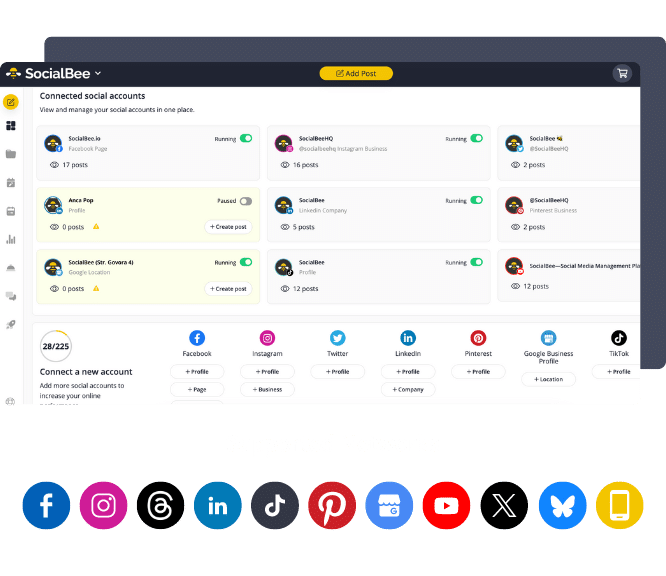
Create posts, publish, analyze, engage and collaborate, all from SocialBee.

